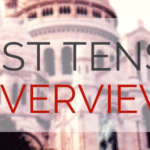
Both English and French conjunctions, at their most basic, are words that connect other words and clauses together in a sentence. Conjunctions include both simple words designed to connect and compare words and clauses, such as the English words:
“And, but, or, nor, for, yet, so”
And words designed to be used as part of a clause, like:
“Until, before, unless, although, without, because, while” (and many more)
Using French Conjunctions in Sentences
French conjunctions do not change forms. Unlike French nouns and adjectives, conjunctions are words with a single spelling that are used the same way when applied to any gender or number of nouns. That rule holds true even if the conjunction itself consists of multiple words.
Single word French Conjunctions
Here are some of the most common simple, single-word French conjunctions.
| Et | And |
| Mais | But |
| Ou | Or |
| Ni | Neither |
| Pour | For |
| Encore | Yet |
French Conjunctions in Clauses
Single-word conjunctions are pretty straightforward to learn, but French clause conjunctions are a little more complicated because specific conjunctions should be followed with the subjunctive past or present instead of the normal indicative past or present tense.
French Conjunctions Clauses Vocabulary Lists
There is a logic to conjunctions that take the subjunctive, but in practice, we’ve found it to be easier to memorize the common indicative conjunction clauses first, because that list is shorter. Then you can assume any other clause conjunctions you encounter should probably be in the subjunctive.
You’ll notice below that all clause conjunctions end in que.
Indicative French conjunction clauses
These conjunctions, in general, convey a sense of certainty (with the exception of peut-être) about how things have taken or will take place. They probably look more familiar to you than the subjunctive clauses list will, because French textbooks use them frequently in sample sentences and in vocabulary lists so that the authors can avoid addressing the rules for subjunctive conjunctions until that lesson comes up.
| après que | after |
| aussitôt que | as soon as |
| parce que | because |
| pendant que | while |
| peut-être que | perhaps |
| puisque | since |
| tandis que | while, whereas |
Subjunctive French conjunctions clauses
Conversely, conjunctions that take the subjunctive generally express uncertainty, as well as time, conditionality, purpose, or negative statements.
| à condition que | under the condition that |
| à moins que | unless |
| afin que | in order that |
| avant que | before |
| bien que | although |
| de façon que | so that |
| de crainte que | out of fear that |
| de peur que | out of fear that |
| en attendant que | while waiting for |
| jusqu’à ce que | until |
| pour que | so that |
| pourvu que | provided that |
| quoique | although |
| sans que | without |
How to get out of using the subjunctive in conjunctions
Many French students are wary of the subjunctive mood, both in recognizing when to use it and in conjugating it properly.
If you’re not confident in your use of the subjunctive yet, you can get around using it in some situations if:
- The subject of the first clause and the second clause are the same, and
- That particular conjunction qualifies for the alternate structure.
The workaround (for the appropriate clauses) is to drop the que and add de + [the infinitive form of the verb].
For example:
Subjunctive: Nous avons mangé une collation avant que nous nous rappelions que j’avais fait une réservation pour le dîner. (“We ate a snack before we remembered that I had made a dinner reservation.”)
De + infinitive alternative: Nous avons mangé une collation avant de nous rappeler que j’avais fait une réservation pour le dîner. (“We ate a snack before remembering that I had made a dinner reservation.”)
When you can’t get out of using the subjunctive
However, the infinitive shortcut does not work for the conjunctions bien que, quoique, pourvu que, and jusqu’à ce que. You must use the subjunctive conjugation or pick a different sentence structure.
There’s no avoiding the subjunctive in this sentence, for example:
Je continuerai à lire jusqu’à ce que je ne puisse plus voir les mots sur la page. (“I will keep reading until I can no longer see the words on the page.”)
In addition to learning the major French clause conjunctions, this lesson hopefully makes it clear that learning le subjonctif is important to master, because it’s hard to avoid it completely.
Next Steps
As previously mentioned, you’ll probably want to make sure you’re confident using both the past and present tenses of the subjunctive mood to fully master conjunctions.




